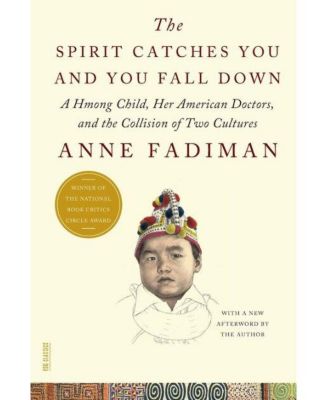The Spirit Catches You and You Fall Down- A Hmong Child, Her American Doctors, and the Collision of Two Cultures by Anne Fadiman
Product details
Web ID: 12622420Undeniably interesting but heart hurting
A story about the cultural clash between empirical western medicine and spiritual Hmong traditions was a book that I did not expect myself to thoroughly read, let alone enjoy. This heartbreaking true story is about a young girl named Lia Lee, diagnosed with epilepsy, and the conflicts between her cultural background, her parents' wishes, and her doctors' refusal to acknowledge these differences results in a story as painful as it is admirable. Everyone in Lia Lee's life tries everything they can to treat her disorder, sometimes breaking cultural traditions, and other times ignoring medical orders, highlighting the differences between cultures under a common goal. Before reading this book, I knew next to nothing about Hmong culture, and after reading it, I'm shocked by how little I still know, despite having learned a lot. This book really showcases the things that make Hmong culture what it is, and it does so because it is necessary context for the rest of the book. The writing style was interesting, being written from Anne Fadiman's point of view, and being organized somewhat like a 19 chapter long essay; however, that isn't a criticism, I think that style of writing suits a story like this one quite well. The part of this book that really makes me wish others would read it has to be the emotional aspect. Lia Lee's condition only seems to worsen throughout the book, and everything tried only seems to make you further question whether she's actually able to be treated. The inability to pick a side, between Lia Lee's parents and her doctors trained in western medicine, leaves you wishing that anyone can do anything to save Lia Lee. Despite how much I was invested in the story, my only criticism is that I think the book is too long. Throughout the book, Fadiman restates points that she had already mentioned earlier, usually for multiple paragraphs. It feels like this story had so much more that she could have written about, but she filled in pages with rephrased details. Overall, this book had me question the impact of emotion and empathy on medicine. In between cultures lies a gap that western medicine cannot fill by itself, a spiritual and traditional gap specifically. While it may not be the healthiest option, this book makes me consider the possibility of western medicine compromising with cultural differences to allow for better understanding and trust between patients and doctors. Western medicine is not the only form of treatment, and illness does weigh partially in an emotional part of your mind. I recommend this book to others because this story perfectly explains that message of understanding, and I also recommend this book because it is just an interesting read.
Recommends this product

Customer review from barnesandnoble.com
A great work of medical anthropology
In the 1980s, a young Hmong child – whose people fought for the Americans during the Vietnam War – had epilepsy after her parents were relocated to California as refugees. Tragically, her parents never adapted to the American medical system, and equally tragically, the American medical system never adapted to them either. The child Lia Lee’s case resulted in a negative outcome, and the Lee family’s difficulty appears utterly humane upon further investigation. In this classic book, Anne Fadiman tries to learn lessons to instruct us all how to avoid such outcomes in the future. This book fortunately received many accolades when first published in the late 1990s and has brought about significant change across the American medical system. It taught us – and continues to teach us – to be mindful of culture’s role in medical encounters. Medicine itself is a culture, and those new to Western medicine have their own culture with their own integrity. Learning to effectively mediate between cultures, for some patients, is at least as vital as the right diagnosis and treatment. In a less heralded contribution, this book highlights the need for cultural brokers, especially among refugees. Refugees are people without a home. Unlike most immigrants, they come to America not as a goal but merely as an act of survival. They seek to leave a substandard refugee camp to anyplace else because they no longer have a home. Unlike other immigrants, they do not run to American culture and its Western medicine; indeed, they may harbor some suspicions of it. Refugee and other social organizations need to be mindful of this dynamic when refugees encounter foreign medical systems. Education and support are certainly required for those new to any land. With the rising challenge of climate change and continuing wars around the globe, the problem of refugees will likely rise throughout this century. Cultural attitudes towards medicine is but a part of this complex problem, along with aspects like nativism, racism, international law, and homophobia. This book eloquently depicts what this looks like. It does not take sides but rather extrapolates both sides’ full practical and ethical ramifications. It concludes that this is an utter tragedy, one that must be learned from. My wife has dedicated her career to educating refugee children, and having spent time on medical wards, I work in the healthcare arena. Thus, my family is familiar with both sides that this saga addresses. Let’s all hope this story is a “worst case scenario.” It seems that American healthcare has grown as has the communities supporting refugees. Reading this book can remind us of why we cannot go back but must push forward.
Recommends this product

Customer review from barnesandnoble.com

